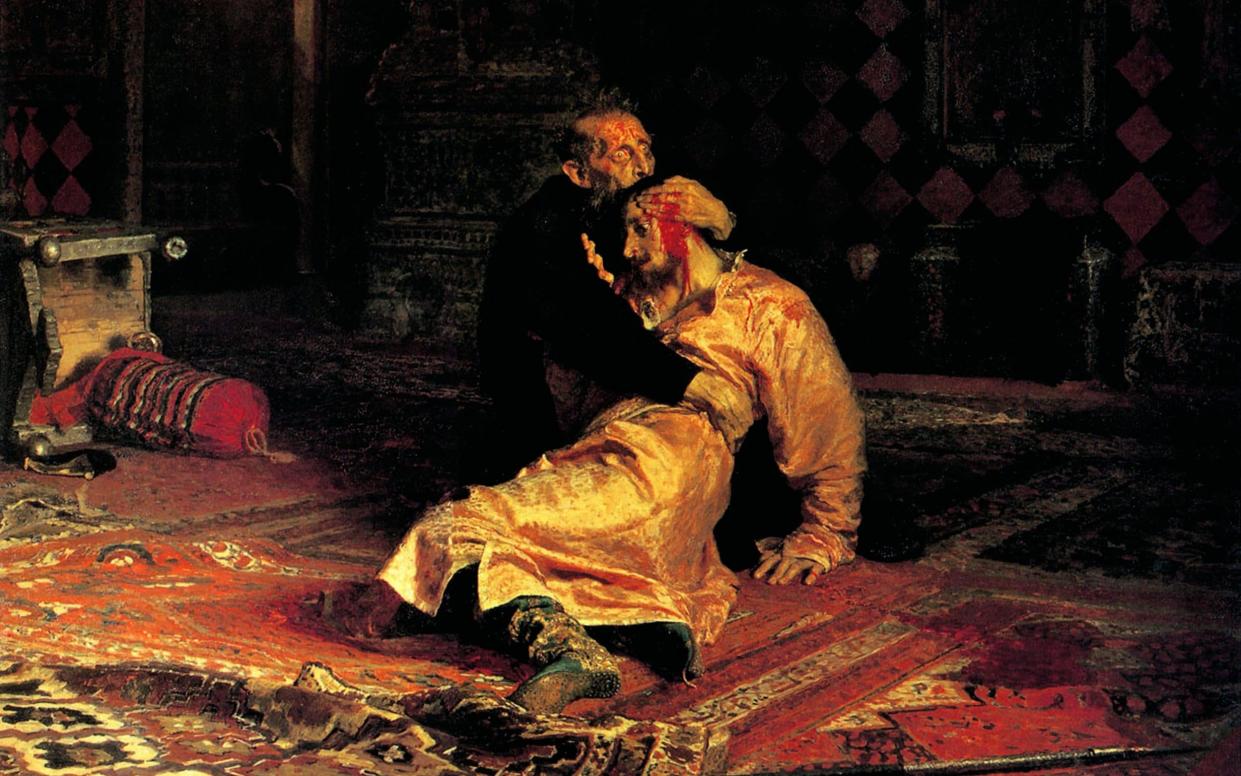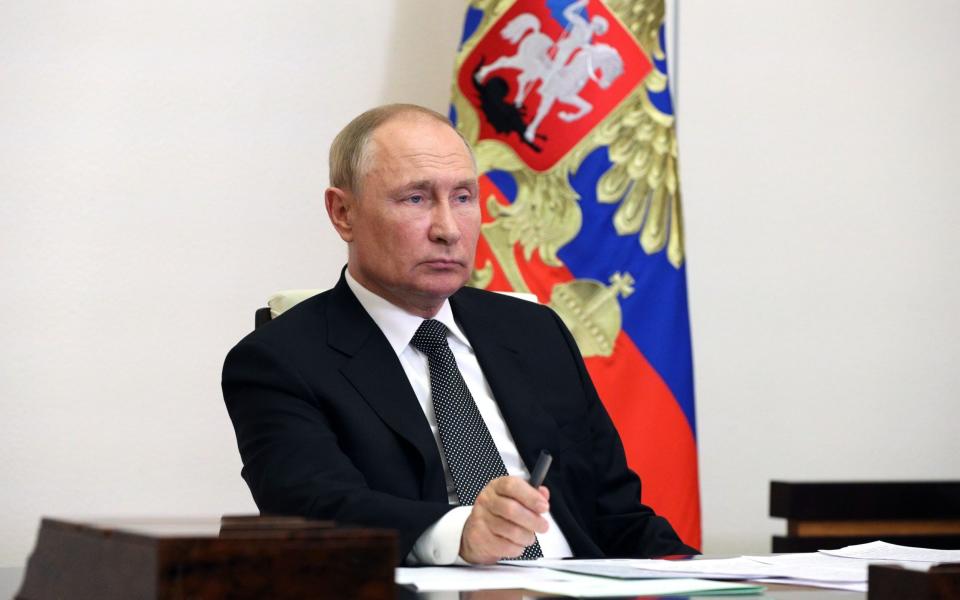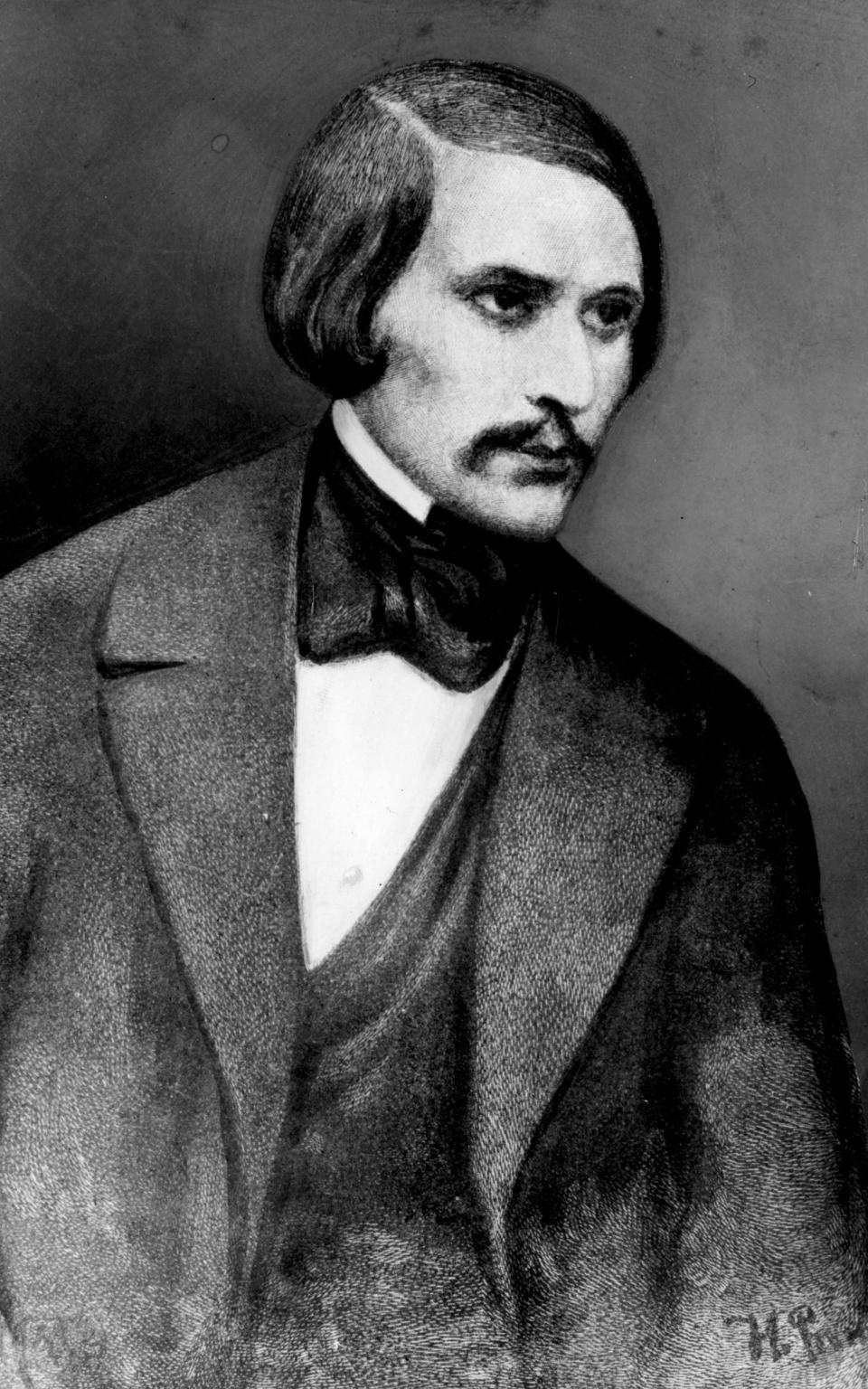To understand Putin's paranoia, read this book on Russia's history

- Oops!Something went wrong.Please try again later.
Russia has played countless roles for the West – foe, ally, scapegoat, magnificent cultural exemplar, mystical giant, eternal puzzle – but never has its reputation in our sphere slumped to the state of moral and geopolitical blackness it currently occupies. Its invasion of Ukraine, which deteriorated into atrocities against civilians and POWs, and the razing of cities (full of Russian-speaking families), has obliterated its standing as a civilised member of the rules-based order.
So now should be a promising time for a book that puts our horror on pause for a moment to tell Russia’s dramatically grand-scale stories and explain the thousand years or so that have brought it to today. Its murders are, of course, legion (as Madame de Staël put it, “In Russia the government is autocracy tempered by assassination”). But so, historically, are ours; and heroism and brilliance, political and artistic, have also played their part.
Orlando Figes’s The Story of Russia would be that book, if only its enthusiasm to tell the story were not inhibited periodically by the academic historian’s insistence on overtelling. Beginning with the many, often conflicting foundation myths of Kyivan Rus’ as Russia’s “ancestral land” – the padstone of Putin’s present claim on Ukraine – and ending where we are in 2022, the author of Natasha’s Dance and A People’s Tragedy gives us the benefit of his encyclopaedic knowledge of Russia’s history. Russia’s imperial reflex, its justification of autocracy and elevation of the mystical Russian soul, the special nature of the tsar-batiushka (“little father-tsar”) as the people’s semi-divine protector, stand at the story’s forefront. So does Orthodox Christianity as the root of its utopian consciousness, its belief, as Figes puts it, “in the certainty of building heaven on this earth, and specifically on Russian soil, according to the early Christian myth of Holy Russia”. It is that ancient root, tangling myth and mysticism tight around every branch of Russia’s body politic, that has done most to disable the country’s progress and excuse its excesses. (I say this as an Orthodox Christian myself.)
The country’s modern destiny begins with Ivan the Terrible: the first tsar, crowned at 16 in 1547, who expanded the principality of Muscovy into the world’s greatest imperial territory. His absolutist career, like Putin’s, reminds one of that of a crime boss. Increasingly insecure, paranoid and fitful, scoring nul points in anger management, he risked his considerable state-building achievements by slaughtering not only hundreds of his boyars (or nobles) but also his heir, Tsarevich Ivan. Enraged at encountering his son’s wife in her chambers wearing only her underwear, he struck her with his stick. His son, intervening, was killed by a blow to the head.
Ivan set the creative-destructive agenda of Russia’s leaders for the next 450 years, and implicitly poses the two questions that the country’s story boils down to. Why was such a vast empire necessary? And could Russia ever escape autocracy?

The answer to the first is that, after the Mongol conquest of the 13th century, as Figes observes, Russia learnt that the best way to defend its relatively flat territory of forests and grassland was to control as much of the Eurasian steppe as possible, and so a continuous blotting-paper imperialism became its reflex means of maintaining stability. The same reflex, by the way, accounts for Ukraine’s invasion today: Putin’s megalomania considers invasion the autocrat’s best defence against the threat of encroaching democracy.
Historically and temperamentally, the several answers to the second question add up to a categorical no. Efforts were made to liberalise Russia – the most obvious is Alexander II’s Emancipation Reform, abolishing serfdom in 1861 – but autocracy almost always followed on from the state’s size and the tsar as its holy embodiment. Catherine the Great (1762-96) maintained that, “Only swiftness of decision in matters sent from distant realms can compensate for the slowness caused by these great distances. Any other form of government would be not merely harmful, but utterly ruinous for Russia.” Bad luck and Mme de Staël’s epigram also contributed, never more decisively than on March 1 1881, when revolutionaries from Narodnaya Volya (“People’s Will”) bombed Alexander II’s carriage in St Petersburg, killing him on the day he had agreed a reform allowing a new public consultative assembly. His reactionary son Alexander III rejected reform and returned to unlimited autocracy, planting the seeds for the revolutions of 1905 and 1917 – and Communism’s further autocracy.
Figes manages his thousand-year narrative conscientiously, bringing to bear some valuable insights – for instance that, having almost forever been an empire, Russia was particularly stunned by the end of Communism. “[Russians] had never been a nation state. Their identity had been subsumed in the Russian Empire, and then in the Soviet Union, where they were regarded as the leading nationality. Russia had existed as an empire for so long that it could not simply reinvent itself as a nation after 1991.”

But the tunnel of chronology is long, and, for stretches, his book loses the story’s vitality in featureless detail. It’s at its most compelling in suggesting big themes: Russia’s defensiveness, its precious mysticism, its autocracies’ inevitable excess. The defensiveness comes from Russia having been a territory colonised throughout its history by peoples from Asia and Europe, and its sense that Europe has never been grateful enough that, in Alexander Blok’s words:
Like slaves, obeying and abhorred,
We were the shield between the
breeds
Of Europe and the raging Mongol
horde.
It’s a mentality that adds an interesting perspective to the arguments about Ukraine’s supposed position as a buffer state – a perspective in which Russia itself is the greater buffer, neither European nor Asian – and is partly responsible for a widely held Russian mysticism that helps to muddy the truth. In the words of the poet Fedor Tiutchev (1803-1873):
Russia cannot be grasped by the
mind,
No yardstick will measure her,
She is of a special kind –
In Russia you can only believe.
As Figes points out, when Nikolai Gogol tried to describe the spiritual atmosphere that set Russia apart from other countries, he ended up despairingly admitting the gulf between his vision and workaday reality, “this is all a dream and vanishes as soon as one shifts to what it really is in Russia”.
Western double standards – that European nations could annex territories with impunity, but when Russia did the same thing it disrupted the balance of power – have been blamed for Russia’s defensiveness. They certainly applied after its defeat in the Crimean War in 1856, when it was forced to dismantle its Black Sea fleet. The humiliation has lasted until today. But as a defence of “Orthodox Russia” under the repressive Nicholas I, the Crimean War should never have been fought. Nicholas’s trust in God was a flight from the reality of corrupt Russian command, primitive equipment and the economy’s weakness; it cost the lives of 250,000 Russians.
It is hugely ironic that Nicholas I is the tsar with whom Vladimir Putin most identifies. He should read the verdict of Nicholas’s own censor, Alexander Nikitenko, who could have been writing about the past couple of decades in his diary: ‘“My God, so many victims […] All at the behest of a mad will, drunk with absolute power… We have been waging war not for two years, but for 30, maintaining an army of a million men and constantly threatening Europe. What was the point of it all?”’
The Story of Russia is published by at £25. To order your copy for £19.99 call 0844 871 1514 or visit Telegraph Books

